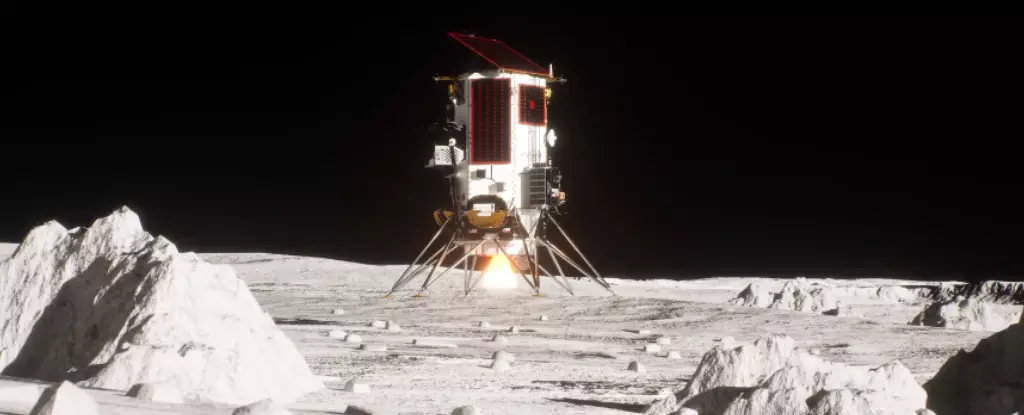In the realm of space exploration, expectations can be both thrilling and burdensome. Recently, Houston-based Intuitive Machines faced a significant setback with its lunar lander, Athena, which landed on the Moon at an awkward angle, echoing the mishaps of its predecessor, Odysseus. As the second attempt culminated in what can only be described as an arched disappointment, the excitement surrounding private space endeavors faces scrutiny once again. It’s not just the engineering; it’s the leadership—visionaries who set the stage for revolutionary advancements but falter at critical turns. What happens when those lofty goals meet the harsh reality of engineering challenges?
The ambitious plan to land on the Mons Mouton plateau, closer to the lunar south pole than any previous mission, was not merely ambitious; it was a statement of intent. There was excitement after the previous triumph, but the recurring narrative of failure is hard to overlook. With the high hopes surrounding their mission, the reality that Athena, much like Odysseus, might not perform as forecast has cast a long shadow over the promised potential of commercial lunar landings. Here’s where the contradiction lies: while private companies purport to usher in a new era of accessible space exploration, they continue to grapple with fundamental challenges that have historically plagued even the most established space agencies.
The Economic Ripple Effects
Investors’ frustrations became palpable when Intuitive Machines’ share price plummeted by 20 percent following the rocky landing event. This financial backlash brings to light a crucial concern within the commercial space sector: the balance between innovation and economic viability. In an era where investors are hungry for rapid returns, setbacks can render a company vulnerable, inciting devastating pullbacks in funding and support.
It’s no accident that other competitors, like Firefly Aerospace with their successful Blue Ghost lander landing, celebrate strides that Intuitive Machines has yet to realize. Each failure sends ripples through the industry, casting doubt on the capabilities of emerging space companies and raising questions about the sustainability of the Commercial Lunar Payload Services (CLPS) program. Will companies thrive if they are not able to deliver on their promises? The unwrapped potential brimming underneath this situation begs for a deeper understanding of what constitutes success in space exploration today.
Technological Limitations and Future Prospects
Each lunar mission carries with it technical ambitions so grand that they often overshadow the challenges of execution. Athena was dispatched with sophisticated payloads intended for groundbreaking experiments, from testing drilling techniques for ice to establishing a cellular communication network on the Moon. However, its uncertain status raises a pivotal question: Can a company innovate under duress? The prospects of these technologies, including the unique hopping drone named Grace, seem dim against the backdrop of the current landing scenario, casting doubts on their feasibility.
The engineering shortcomings of both the Athena and Odysseus landers illustrate the unpredictable unpredictability of advanced aerospace technology. Despite achieving onboard improvements like enhanced cabling systems, the reality remains that the unknown variables of extraterrestrial terrain and unforeseen operational failures are formidable obstacles. If even the most carefully crafted upgrades fail to ensure a proper landing, one must ponder whether the industry’s ambitious milestones may be cast too broadly, too soon.
The Human Element: Innovation versus Accountability
As Intuitive Machines navigates the aftermath of its second lunar mission blunder, one must consider the human aspect behind this venture—leaders, engineers, and supporters fueling the ambitions of space exploration. Leaders like CEO Steve Altemus play crucial roles in shaping narratives around failures and successes, yet they must also remain accountable. For the layperson, the implications of failed endeavors in space can feel distant; however, they directly affect public trust and enthusiasm, critical components of any venture reliant on human capital.
Even as technological advancements promise to change the terrain of exploration, human judgment and foresight remain vital. Moving forward, Intuitive Machines must strive not just to execute plans, but to foster a sense of rational optimism within the public and within themselves. The symbiosis of unwavering ambition and practical accountability is needed if they are to turn this narrative of disappointment into a resurgence of hope—the kind that truly embodies the essence of exploring the great unknowns beyond our atmosphere.

